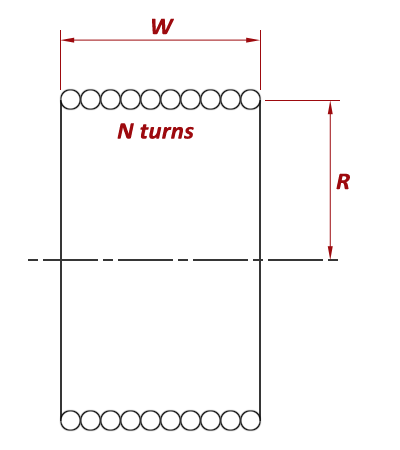EFHW antenna designer
Design an End-Fed Half-Wave (EFHW) or an End-Fed Random-Length (EFRL) antenna, in inverted-L, or inverted-Vee, or sloper form, using a single main support. The EFHW antenna is designed for one principal amateur HF band, usually 80 meters or 40 meters, but typically displays VSWR minima on several higher, harmonically-related, bands and can therefore be a good multi-band antenna. Being an end-fed antenna with a high feed-point impedance and high feed-point voltage, it is used with an unun - typically 49:1, 64:1, or higher - to bring the impedance down to a range which can easily be handled by an antenna matching unit. Read more...
EFHW or EFRL antenna? » » »
- EFHW - as the name suggests, this is a half-wave antenna (half-wave on the principal band) and so its' length is calculated for you by the program using basic physics. This calculation, being based on the principal frequency/band, means that this type is resonant on at least one frequency/band, and can also be resonant on multiple other, harmonically-related frequencies/bands as well. The WARC bands are not generally well covered. The EFHW will present very high impedances, typically around few thousand ohms, and will be used with a high-ratio unun in the range 49:1, 64:1 or even higher.
- EFRL - this is an antenna, the length of which is carefully chosen to be not resonant on any of the frequencies or bands where it will be used. In addition, the length chosen should result in an antenna which presents impedances which are in the middle to high hundreds of ohms on bands of interest, and an unun ratio in the range of 8:1 to 10:1 would be used to transform the antenna's impedance down to the 50 ohms of the coaxial cable. Many bands can be covered, including some WARC bands.
| Length, feet |
Length, meters |
Bands* |
| 29.0 | 8.84 | 30m - 10m |
| 35.5 | 10.82 | 40m - 10m |
| 41.0 | 12.50 | 40m - 10m |
| 52.0 | 15.85 | 60m - 10m |
| 58.0 | 17.68 | 60m - 10m |
| 71.0 | 21.64 | 80m - 10m |
| 107.0 | 32.61 | 80m - 10m |
| 119.0 | 36.27 | 80m - 10m |
| 135.0 | 41.15 | 160m - 10m |
| 148.0 | 45.11 | 160m - 10m |
| 203.0 | 61.87 | 160m - 10m |
| 347.0 | 105.77 | 160m - 10m |
| 407.0 | 124.05 | 160m - 10m |
| 423.0 | 128.93 | 160m - 10m |
|
*
Some bands may not be available
or tunable in your setup |
||
Get started » » »
- Use the controls on the left-hand side to configure your antenna - set the design frequency, antenna element lengths and angles, wire diameter, wire insulation if required, support height, etc.
- When you are happy with your configuration, press the "Show antenna" button to display your antenna in interactive 3D graphics mode in the area on the right-hand side. Each time you change your configuration, you should press the "Show antenna" button to register the changes to the app.
-
After you have configured your antenna, you can then use the controls further down in the page to generate charts and diagrams to evaluate
the antenna's performance - you will need to
scroll down in the page
to access these controls.
You can choose to view any combination of the available charts and diagrams: these include four radiation pattern types: azimuth, elevation, 3D and polarization patterns; other options include VSWR charts, an antenna currents diagram, and a Smith chart.
|
|
Set antenna color: |
||||||||||||||||||||||||||||||||||||||||||||||||||||||||||||||||||||||||||||||||||||||||||||||||||||||||
|
EFHW (End-Fed Half-Wave) antenna designer
portable-antennas.com
Antenna feed-point: ⬥
Inductance load: ●
|
||||||||||||||||||||||||||||||||||||||||||||||||||||||||||||||||||||||||||||||||||||||||||||||||||||||||
Antenna performance
Here you can generate plots of
radiation patterns,
VSWR chart, antenna currents diagram and Smith chart for your antenna over a
choice of ground types. By changing the physical dimensions of the antenna, and refreshing these plots, you can learn a lot about
how such antennas will perform in the field.
Please note that
radiation patterns are here modelled over flat ground -
when the antenna is erected on a hill-top or mountain summit, the surrounding sloping ground will generally cause angles in
the elevation radiation pattern to be lowered in the direction of the
slope: the steeper the slope, the lower the effective elevation take-off angle will be, and the better the chances of making
long-distance contacts.
Read more...
|
Choose ground type of
land in the vicinity of the antenna: |
Conductivity:
S/m
Dielectric const.:
F/m
|
| View radiation patterns: |
|
| Choose type: | |
| Set ref. elevation angle: |
|
| Set ref. azimuth angle: |
|
| Radiation patterns for: |
|
|
Patterns hover info:
|
|
| View VSWR chart: | Check on: From: To: |
| Display impedance curves: | Using unun |
| Impedance curves scales: | |
| Effect of coax on VSWR: |
Coax length:
Type:
|
| View currents diagram: | |
| View Smith chart: |
|
|
Antenna gains at 0° elevation: |
|
| Antenna efficiency: | |
| Antenna impedance: | |
| Estimated bandwidth: | |
